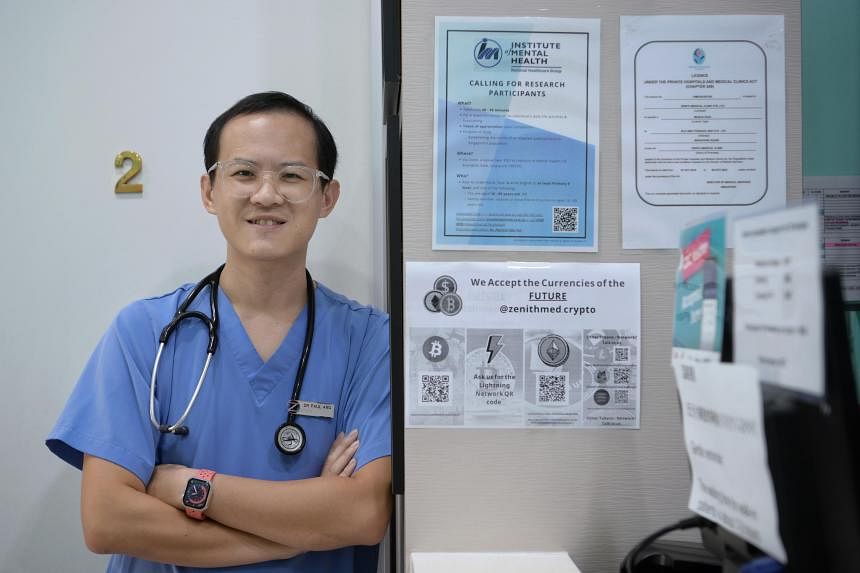SINGAPORE – With stools spilling out of its shopfront and a queue of patients running out the door, the Zenith Medical Clinic in Punggol looks like any other clinic in the heartlands.
But there is one key difference, patients at this clinic can choose to pay their doctors using cryptocurrency.
The doctors who run the clinic, brothers Paul Ang and David Ang, made the unconventional decision four years ago to accept cryptocurrencies after they developed an interest in these digital tokens.
One perk of accepting payments in this form is that the clinic does not have to pay fees to use these services, said Dr Paul Ang, 36, pointing out that credit card companies can charge more than 2 per cent per in fees on each transaction.
“These are all predatory taxes imposed on businesses, which are extra costs that will be passed on to consumers ultimately,” he said.
The clinic accepts digital currencies Bitcoin and Ether, and payment is made by scanning a QR code.
Instead of cash, patients who use cryptocurrency pay an equivalent value in cryptocurrency depending on the digital token’s current market value, said Dr Paul Ang.
“Very, very few people” have paid in cryptocurrency so far, said Dr Paul Ang, who estimates that the number is less than 0.1 per cent of the patients they see. Those who do so are mostly foreigners between 30 and 40 years old.
He puts that down to the belief among crypto investors that the value of digital currencies will appreciate.
“If people think that the price will keep increasing, why would they spend it? But when cryptocurrency prices are high, people might be more willing to do so,” he said.
There are no official statistics on the number of medical practices in Singapore that accept cryptocurrency, but Dr Paul Ang estimates that there are less than 10 clinics here that do so.
He first became interested in cryptocurrency about six years ago after reading books that reinforced his belief in the value of digital tokens as a form of currency more independent from the control of banks and government than cash.
While he acknowledged that cryptocurrencies can be volatile, and it can be risky holding on to large amounts of these digital tokens, he points out that there are risks in investing in property and stocks too.
“I believe that what goes up will come down, and what goes down will come up. It’s just the law of nature,” said Dr Paul Ang.
“Every (investment) has a risk, if you cannot accept that kind of mindset, leave the money in a bank. If you cannot take the risk, you won’t be able to make money.”
Use of crypto stays low in Singapore, but is rising in some emerging Asian markets
What crypto consumer protection rules are there in the world?
The Monetary Authority of Singapore (MAS) said in response to queries that it does not set requirements on whether businesses can accept digital payment tokens (DPTs) as payment.
Under the Payment Services Act, businesses can do so as long as they are licensed and regulated.
The MAS spokesman also added that businesses should understand the nature of DPTs and the risks in accepting them as payments.
“DPTs are not legal tender, they are not issued by any government and their market value can be highly volatile,” said the spokesman.
While clinics are free to accept cryptocurrencies as payment, lawyer Adrian Ang said doctors should ensure they keep to applicable ethical standards, such as setting fair and reasonable prices, and making these costs open and transparent to consumers.
“If the value of the cryptocurrency in question increases significantly, the clinic should consider if the price quoted for a particular medical service in this particular cryptocurrency still falls within applicable ethical standards,” said Mr Adrian Ang, who is the co-head of Allen and Gledhill’s fintech practice.
Patients too should be wary of price fluctuation risks, he said.
For instance, a patient going for a course of treatment that spans a year might think that it would cost a certain value of cryptocurrency each month, but if the value of that particular digital token falls during this period the price could be revised upward, he added.
The patient might end up with not having “enough cryptocurrency to pay for the remaining medical treatments”, he said.
Crypto.com gets major payment institution licence from MAS
2 more firms get MAS approval to offer crypto payment services in S'pore
Join ST’s WhatsApp Channel and get the latest news and must-reads.
p.st_telegram_boilerplate:before {
display: inline-block;
content: ” “;
border-radius: 6px;
height: 6px;
width: 6px;
background-color: #12239a;
margin-left: 0px;
margin-right: 13px;
}
a.st_boilerplate {
font-family: “SelaneWebSTForty”, Georgia, “Times New Roman”, Times, serif;
}


